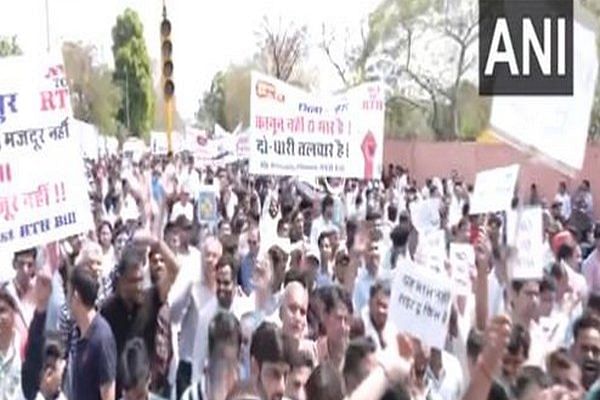Access to quality healthcare is an essential human right that plays a critical role in upholding the democratic paradigm. It is a cornerstone of social justice, equity, and human dignity. In recent years, there has been a growing momentum around the idea of Universal Health Coverage as a way to ensure that individuals, regardless of their geographic location, race, religion, or financial status, have equitable access to affordable and high-quality healthcare.
The Right to Health (RTH) bill passed by Rajasthan amid mass protests and criticism is touted to be a step in the pursuit of Universal Health Coverage (UHC) in the state. The bill, which aims to ensure health as a fundamental right, has good intentions but is vastly misdirected in its approach. Let’s take a closer look at the facts and figures of India’s healthcare system and the implications of the RTH bill.
Unequal partners
India’s healthcare system is a mix of public and private sectors. Both sectors play an essential role across the healthcare value chain. Public and private players are involved in everything from providing health access (provider network) to paying for the treatment of citizens (payer network) to research and development of new treatment pathways. According to data from the National Health Profile 2019, India has 69,265 hospitals with a total of 18,99,228 beds. Out of these, the public sector accounts for 37 per cent of the capacity with 25,778 hospitals and 7,13,986 beds, while the private sector accounts for the majority (63 per cent) with 43,487 hospitals and 11,85,242 beds.
This highlights two important points. One, it is the private sector that provides a larger share of care. Two, the majority of secondary and tertiary quality care is provisioned by the private sector while the public sector is often in a dismal state, except for a few large hospitals run by the central government such as the All India Institute of Medical Sciences (AIIMS) and Post-Graduate Institute (PGI). This further necessitates the need to take stakeholders from the private sector in confidence before any major policy overhaul is made in the state’s health policy.
It is these consultations and confidence-building exercises where the Rajasthan government first failed. The provision to provide free healthcare and emergency services to all residents of the state will lead to significant costs for the providers. The doctors and physicians who selflessly treated people during the pandemic and filled the institutional gap left by state services are now being treated as unequal stakeholders in public health in Rajasthan.
Second, the bill mandates free treatment without making corresponding provisions in the budget. The health package rates that will be provided to hospitals for treating patients have also not been revealed. This highlights that the RTH bill is not an exercise to better the health policy, health access and equity in the state. It is rather being used to drive a populist election narrative or has intentions best known to the state’s incumbent leaders.
Also read: Why Rajasthan Right to Health Bill has become flashpoint between doctors & civil society groups
Escaping Bimaru tag
Third, these provisions have not only created chaos and unrest on the street, they will also have a detrimental effect on ensuring quality healthcare in the state. Private healthcare stakeholders are likely to be hesitant in investing in quality care, building hospitals, and undertaking research and development because of the uncertainty regarding the returns. This could potentially lead to a flight of doctors and investors away from Rajasthan, further hampering the state’s efforts to shed the ‘Bimaru’ tag.
Fourth, the implementation of this bill will provide bureaucratic control over doctors and hospitals. The 24-hour helpline, inspections, and punishment for denial of care will become tools in the hands of the administration to bend doctors to their will. This will put the core of healthcare — the patient — at the end of the value chain and negatively impact patient outcomes. It may also deteriorate the relationship between physicians and patients, as the state becomes the ultimate payer and decision maker, rather than decisions being made with the mutual understanding of physicians and patients.
It is jarring that in today’s day and age when citizen participation in governance is increasing, Rajasthan is taking a ride in the opposite direction. The state government should have desisted from making unilateral decisions and extending exemptions upon protests. A consultation should have happened between physician organisations, investors, patient advocacy groups and the state government to formulate a workable plan. Rates for emergency services should have been pre-decided and opened for public input. For non-emergency services, the payer network should have been expanded through public and private funding to ensure hospitals could recover their costs.
Judging by the current state of affairs and the process followed, it seems that the Rajasthan government neither considers the private sector an equal partner nor does it think that doctors have the patient’s best interests in mind. For a meaningful public health policy, this situation must change and the RTH bill must be fully scrapped.
Lakshit Mittal is track chair for Health, Wellbeing and Sports at Y20 (G20 Youth). He tweets @lakshit_sm.
Sonakshi Dogra is a political consultant with Varahe. She tweets @DograSonakshi.
Views are personal.



